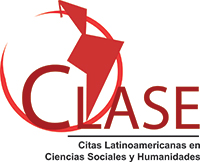REPENSAR LA CIENCIA Y LA TECNOLOGÍA EN LATINOAMÉRICA CON AYUDA DEL ESTADO
Resumen
El presente trabajo se orienta con la interrogante: ¿Qué implicaciones tiene para los países en desarrollo como es el caso de México no ofertar localmente sus necesidades tecnológicas, dependiendo estructuralmente de los países centrales que sí cuentan con las capacidades para promover y consolidar tecnologías de vanguardia?
Para cubrir el objetivo del presente documento, éste se estructura en dos apartados:
- Algunas definiciones de tecnología.
- Los principales enfoques económicos que interpretan el desarrollo tecnológico de los países periféricos y el papel que le compete al Estado en esta problemática.
Descargas
Citas
Amsden, Alice (1989). Asia's Next Giant: South Korea and Late Industrialisation, Oxford University Press, Nueva York.
Bell, M. y Pavitt, K. (1992). “Accumulating Technological Capability in Developing Countries”, Annual Conference on Development Economics.
Bell, M y Albu, M. (1999). “Knowledge Systems and Technological Dynamism in Industrial Clusters in Developing Countries”, World Development, vol. 27, núm. 9.
Bunge, M. (1972). La investigación científica, su estrategia y su filosofía, ediciones Ariel, Barcelona, España.
Cimoli, M. (2005). Heterogeneidad estructural, asimetrías tecnológicas y crecimiento en América Latina, Cepal y BID, noviembre.
Cimoli, M. et al (2005). Cambio estructural, heterogeneidad productiva y tecnología en América Latina, Mario Cimoli, editor, Cepal y BID
Chalmers, J. (1987). “Political Institutions and Economic Performance: The Government-Business Relationship in Japan, Korea and Taiwan”, F. Deyo (ed.), The Political Economy.
Dosi, G, Freeman, C, Nelson, R. and Soete, L. (l988). Technical Change and Economic Theory, Pinter, London.
Ernst, D. y Linsu K. (2002). “Global Production Networks. Knowledge Difusión and Local Capability Formation”, Research Policy, Vol. 31.
Fajnzylber, F. (1983). La industrialización trunca de América Latina, Nueva Imagen, México.
Freeman, C. (1982). The Economics of Industrial Innovation, F, Printer, London.
Freeman, C. y Pérez, C. (1988). “Structural Crises of Adjustment: Business Cycles and Investment Behaviour”, G. Dosi, R.
Gereffi, y Korzeniewicz, M. (1994). “Introducción”, G. Gereffi y M. Korzeniewicz (eds.), Commodity Chains and Global Capitalism, Praeger, Wesport.
Gereffi, G. (1994). “The Organization of Buyer-Driven Commodity Chains: How US Retailers Shape Overseas Production Networks”, G. Gereffi y M. Korzeniewicz…
Gereffi, G. (1990). “Paths of Industrialization: An Overview”, en G. Gereffi y D. Wyman (eds.), Manufacturing Miracles. Paths of Industrialization in Latin America and East Asia, Princeton University Press, Princeton.
Gereffi, G. (1995).“Global Production Systems and Third World Development”, Barbara Stallings (ed.), Global Change, Regional Response: The New Internacional Context of Development, Cambridge University Press, Nueva York.
Gerschenkron, A. (2002). “Economic Backwardness in Historical Perspective”, en Amita K. Dutt (ed.), The Political Economy of Development, Vol. I, an Elgar Reference Collection, Cheltenham.
Holland, M. y Porcile, G. (2005). Brecha tecnológica y crecimiento en América latina. Editor Cimoli: heterogeneidad estructural, asimetrías y crecimiento en América Latina, CEPAL y BID.
Hirschman, A. (1961). La estrategia del desarrollo económico, Fondo de Cultura Económica, México.
Katz, J. y Kosacoff, B. (1998). “Aprendizaje Tecnológico, Desarrollo Institucional y la microecoeconomía de la Sustitución de Importaciones. IDES (Instituto de Desarrollo Económico Social)”, Revista de Ciencias sociales: Desarrollo Económico, vol. 37, N° 148, ene/ mar, Buenos Aires, Argentina.
Kaplinsky, R. (2000). “Globalisation and Unequalisation; What Can Be Learned from Value Chain Analysis?”, Journal of Development Studies, vol. 27, núm. 2, diciembre.
Kim, L. (1980). “Stages of development of Industrial Technology in a Developing Country: a Model”, Research Policy, vol. 9, núm. 3.
Kim, L (1997). “Imitation to innovation. The Dynamics of Korea´s Technological Learning”, Harvard Business Scholl Press, Boston.
Lundvall, B. (1992). National System of Innovation. Towards a Theory of Innovation and Interactive Learning, Pinter, Publishers, London.
Nelson, R. (1993). National System of Innovation, Oxford, University Press.
Nelson, R. y Winter, S. (1982). An Evolucionary Theory of Economic Change, Harvard University Press, Cambridge, Mass.
Nelson, G. y Soete, L. (2001). Technical Change and Economic Theory, Pinter Publishers, Londres.
Nelson, R. y Pack, H. (1999). “The Asian Miracle and Modern Growth Theory”, The Economic Journal, núm. 109, Julio.
Nonaka, I. y Takeuchi, H. (1995). The Knowledge Creating Company. How Japanese companies Created the Dynamics of Innovation, Oxford University Press, Nueva York.
Méndez, R. (1997). Geografía económica: la lógica espacial del capitalismo global, Editorial Ariel, Madrid, España.
Osorio, C. (2002). “Enfoques sobre tecnología”, Revista Iberoamericana de Ciencia, Tecnología, Sociedad e innovación, número 2/enero abril.
Pérez, C. (1992). “Cambio técnico, reestructuración competitiva y reforma institucional en los países en desarrollo”, El Trimestre Económico, Vol. LIX (1), núm. 233, enero-marzo
Pérez, C. (2001). “Cambio tecnológico y oportunidades de desarrollo como blanco móvil”, Revista de la CEPAL, No 75 diciembre.
Pérez, C. (2002). Technological Revolutions and Financial Capital. The Dynamics of Bubles and Golden Ages, Edward Elgar, Cheltenham.
Pérez, C. (2004). Conferencia presentada en el Seminario Anual del Círculo de Innovación de Icare, Santiago de Chile, Julio 2004
Quintanilla, M. (1988). Tecnología: Un Enfoque Filosófico, Fundesco, Madrid.
Reinert, E. (2000). “The role of technology in the creation of rich and poor nations: underdevelopment in a schumpeterian system", en Aldcroft y Catterall (ed.), Rich Nations-Poor Nations, the long-run perspective, Edwrd Elgar Publicshing Company, Vermont.
Sánchez, D. (2005). “Capitalismo, desarrollo y estado. Una revisión crítica de la teoría del Estado de Schumpeter”, Revista de Economía Institucional, Vol. 7, No 13, segundo semestre/2005.
Sagasti, F. (1981). Ciencia, tecnología y desarrollo, Colegio de México
Schmitz, H. y Knorringa, P. (2000). “Learning from global buyers,” The Journal of Development Studies, Taylor and Francis Journals, vol. 37(2), December.
Sztulwark, S. (2005). “Especialización Productiva y Subdesarrollo en el Paradigma Informacional. Una Aproximación a Partir del Caso de las Semillas Transgénicas y su Difusión en la Argentina”, Ponencia en el XI seminario Latino-Iberoamericano de gestión tecnológica, ALTEC 25 al 28 de octubre.
Wade, R. (1990). Governing the Market. Economic Theory and the Role of Government in East Asian Industrialization, Princeton University Press, Princeton.
Weiss, L. (1998). The Myth of the Powerless State, Cornell University Press, Ithaca.
Winner, L. (1977). Tecnología autónoma, Editorial Gustavo Gili, Barcelona, España.
Westphal, L. (1978). “The Republic of Korea´s Experience with Export- Led Growth Industrial Development”, World Development Report, num. 6.

Esta obra está bajo licencia internacional Creative Commons Reconocimiento-NoComercial-CompartirIgual 4.0.














